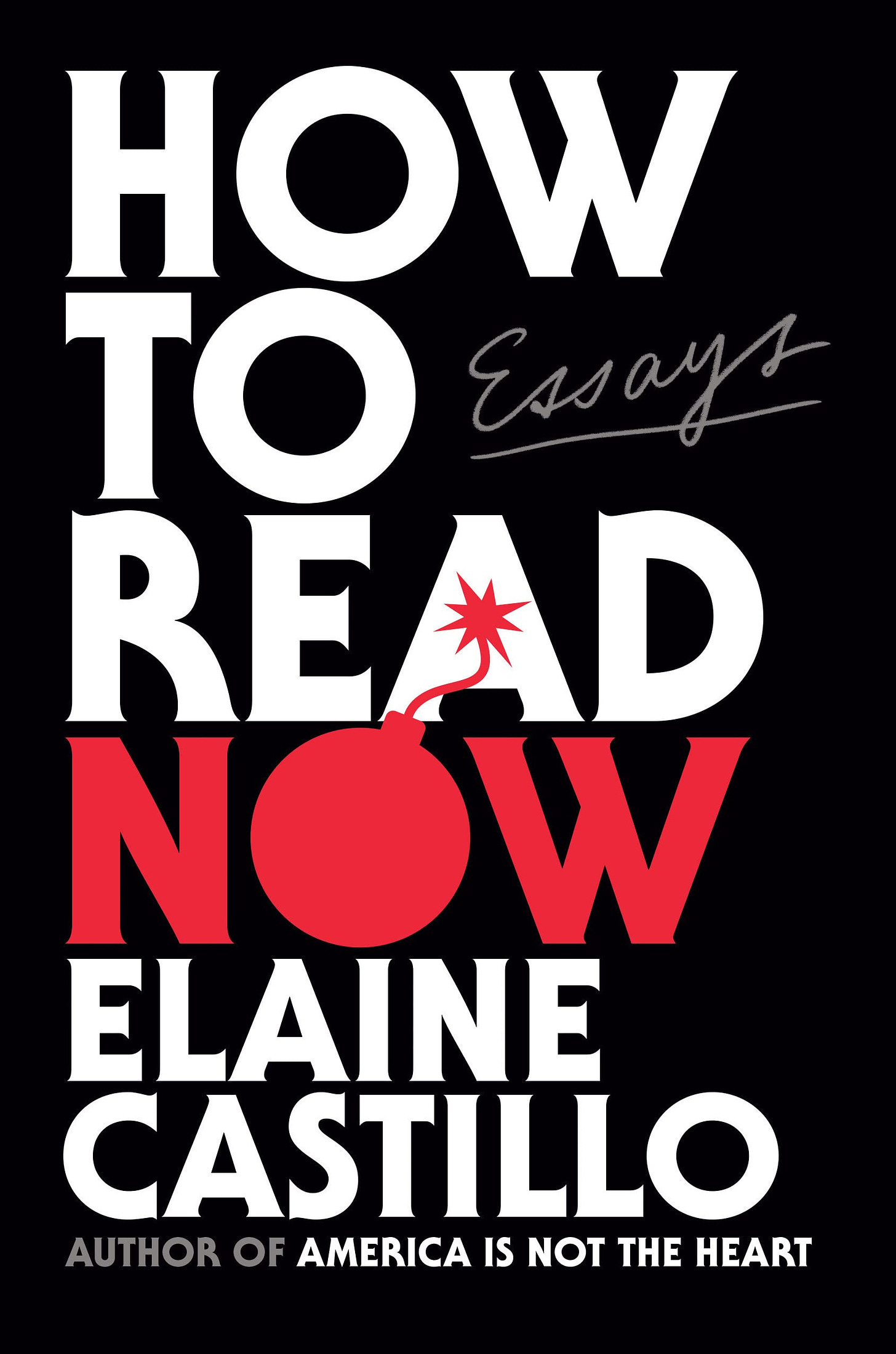I was captivated by a lot of the wisdom in Elaine Castillo’s fresh, fascinating book How to Read Now so I reached out to her to see if she might be interested in doing a Q&A. I learned that she is facing a health crisis and isn’t doing any public stuff for awhile. I wish her and/or her family and friends fast healing and, in the meantime, I thought you don’t need to be deprived of her wisdom because I can just give it to you via my favorite excerpts! So here they are — I’ve fashioned a question for YOU, the reader, after each one. Please answer the ones that call to you in the comments section.
Elaine’s father was as a security guard who mostly kept to himself, but introduced her to a wide range of literature, some of which some people might have thought was way over her little, hungry head. Of this she wrote: “My father died penniless and indebted, and I inherited nothing from him—nothing but my entire life: the frequency at which my attention to the world resonates, and most of all, that bone-deep, soul-shaped pride, which to this day I feel move in me, like a chord that will not go silent.”
Who gave you books?
“Our practice taught me most of all to read like a free, mysterious person who was encountering free, mysterious things; to value the profound privacy and irregularity of my own thinking; to spend time in my head and the heads of others, and to see myself shimmer in many worlds—to let many worlds shimmer, lively, in me.”
In what ways does your reading enable you to be a “free, mysterious person” and to “shimmer in many worlds”?
“We largely end up going to writers of color to learn the specific—and go to white writers to feel the universal…The problem is, if we need fiction to teach us empathy, we don’t really have empathy, because empathy is not a one-stop destination; it’s a practice, ongoing, which requires work from us in our daily lives, for our daily lives—not just when we’re confronted with the visibly and legibly Other. Not just when a particularly gifted author has managed to make a community’s story come alive for the reader who’s come for a quick zoo visit, always remaining on her side of the cage.”
In what ways do you look to literature to build your own empathy? How do you extend your learning beyond the last turn of the page? Or how do you wish you did?
“What if our artistic practices were founded not on the presumption of artistic freedom—certainly, at least, not the individualistic, late capitalist brand of American freedom? What if we as artists didn’t fight tooth and nail to safeguard the freedom to do whatever we wanted in our art—in fact, what if we didn’t come to art to practice the trite choreography of that freedom at all? What if art was the space not for us to enjoy our freedom, but for us to encounter our bondages—and our bondedness? That in our art making and our art consumption, we paid attention not just to the things that made us feel free, expansive, containing multitudes, but to the things that remind us we are not just free but delimited—the things that make us feel our smallness, our ordinariness, our contingency, our vulnerability and reliance? The things that make us feel not neutral but named—actually known by the world, so that we might be truly in it, and of it?”
What books have you read that reminded you of your smallness, ordinariness, vulnerability?
“How do we hold ourselves accountable—the root of the word accountable meaning: how do we let the story of ourselves be told? How do we hold ourselves accountable to the things we’ve received and internalized: the knowledges and unknowledges, the narratives, silences, and violences, the particularities? To hold ourselves accountable—to truly hold ourselves, within the depth and vastness of our stories, and remain there, in their thrumming inconsolability—means that in our art, we bring to bear not our most powerful, authoritative, intelligent selves, but: our most particular, our most precarious, our most dependent selves.”
How do you hold yourself accountable to your most particular and precarious self in the art you make — whether that’s writing or cooking or gathering or any other creation?





After reading these excerpts, I purchased the book immediately.
I could have commented on any, though some at too much length for this space, so I will comment on one I can do compactly. How do I keep learning after the last page?
I keep my own form of commonplace book. When I read, if there is a statement that feels either true or even wrong in the closest way, and often if it beautifully expresses something I feel in my own heart, I write it on a postcard. The postcard becomes part of a deck.
Each day I pull three cards from that deck and write to myself about them and how they intersect to me.
I cycle through these in threes, over and over, knitting them into each other and into me in various combinations. This tapestry becomes part, then, of how I am, the choices I make, and actions I take, in the world.
Interesting perspective.
For me, reading and making (visual) art are opportunities to be present: to slow down, and focus on the words, or the creation. It calms my monkey brain.
As a child, reading was a source of stimulation and fed my imagination.
As an adult, artwork (and other artists) are teaching me to trust my own voice.
Reading and artwork keep me (somewhat:) sane.